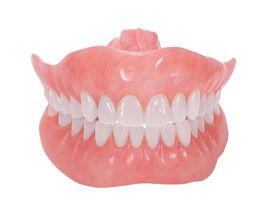Partials and Dentures
Dentures: Complete and Partial
At Back 2 Basics Dentistry one of the procedures we fully enjoy is dentures. It is not always an easy choice for a patient to go from losing any remaining teeth and move into a denture. We understand that and we put our full heart into helping our patients with that transition. For others who are already in a denture but are looking for a new one due to fit or a brighter smile we love doing that too! If you or someone you know is interested in dentures the information below can help explain the sometimes complicated world of dentures.
A denture is a removable replacement for missing teeth. Two types of dentures are available – complete and partial dentures. Complete dentures are used when all your teeth are missing, while partial dentures are used when some of your natural teeth remain.

Partial dentures can be made of several types of material, acrylic, flexible and cast metal. Complete dentures can be either “conventional” or “immediate.” Made after your teeth have been removed and the gum tissue has begun to heal, a conventional denture is ready for placement in about 8 to 12 weeks.
Unlike conventional dentures, immediate dentures are made in advance and can be positioned as soon as the teeth are removed. As a result, you do not have to be without teeth during the healing period.
Partial dentures are used when one or more of your natural teeth remain in your upper or lower jaw. A fixed (permanent) bridge replaces one or more teeth by placing crowns on the teeth on either side of the space and attaching artificial teeth to them. A precision partial denture is removable and is a more natural looking.
Will Insurance Cover the Cost of Dentures?
Most dental insurance providers cover some or all of the cost of your dentures. However, we should contact your dental insurance provider to find out the specifics.
What Will My New Dentures Feel and Look Like?
New dentures may feel a little odd or loose for a few weeks until the muscles of your cheek and tongue learn to keep them in place and you get comfortable inserting and removing them. They are made to closely resemble your natural teeth so there should be no noticeable change to your appearance. In fact, dentures may even improve your smile and fill out your facial appearance. If after a period of time the patient does not feel confident in the fit or the individual anatomy won’t allow for a secure fit the placement of a couple dental implants will allow the denture to “snap” on and give the patient the confidence that the denture will stay in place and allow the patient to enjoy more foods such as corn on the cob or biting into an apple!

Will Eating With New Dentures Be Difficult?
Eating with new dentures will take a little practice and may be uncomfortable for a few weeks. To get used to the new denture, we recommend you start with soft foods. As you get used to your new dentures, add other foods until you return to your normal diet.
If you have been considering dentures but are not sure if they are right for you, please call our office today to set up an appointment. We can answer any questions you might have and explain any details that may concern you.